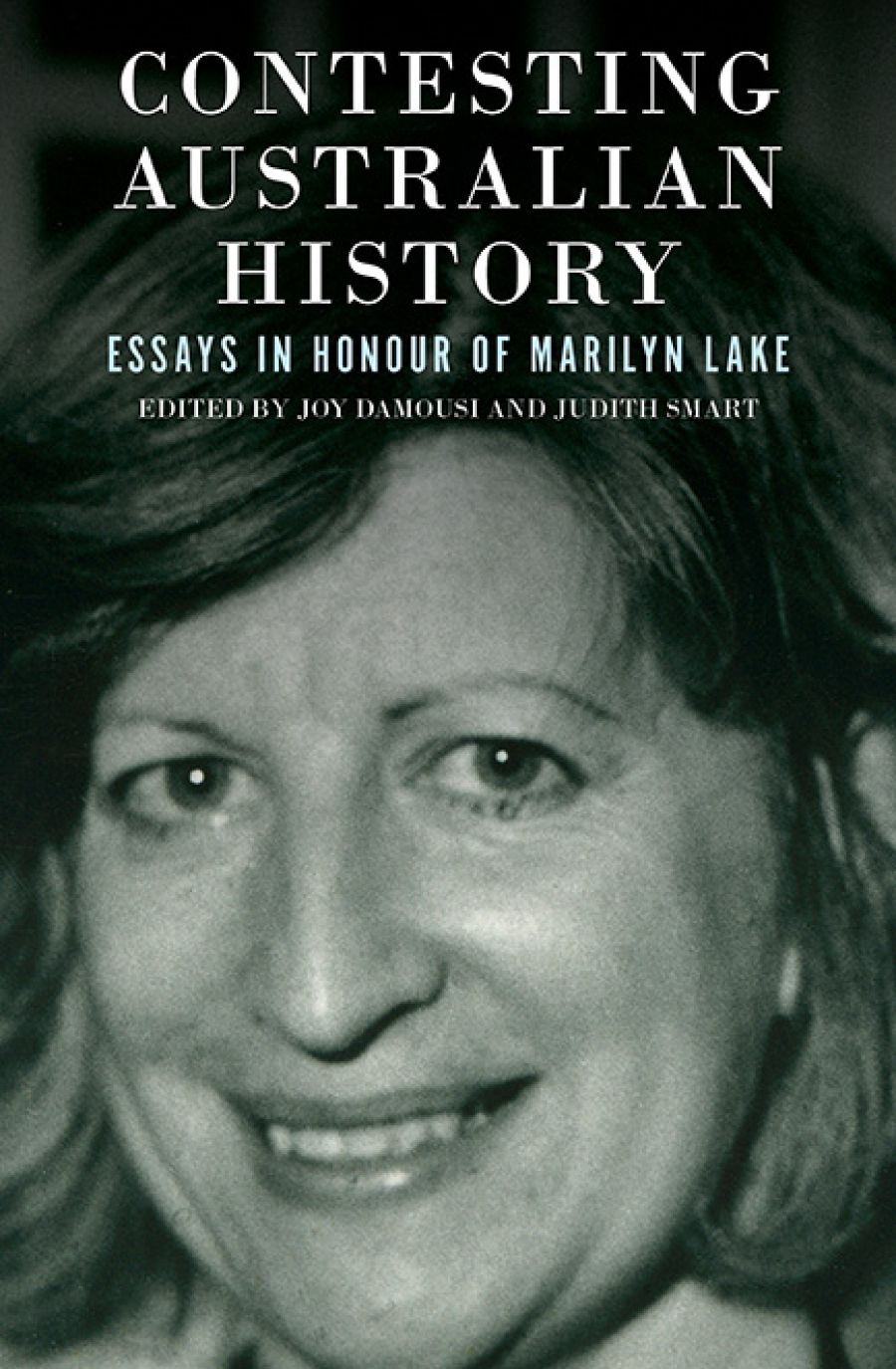
- Free Article: No
- Contents Category: History
- Custom Article Title: Christina Twomey reviews <em>Contesting Australian History: Essays in honour of Marilyn Lake</em> edited by Joy Damousi and Judith Smart
- Custom Highlight Text:
Marilyn Lake is without doubt one of the most influential historians in and of Australia in the last thirty years. ‘SIGN. US. UP’ writes Clare Corbould, one of the contributors to this festschrift, when describing the reaction of her postgraduate self and friends to seeing Lake sweep through the crowd at a history conference in the late 1990s ...
- Book 1 Title: Contesting Australian History
- Book 1 Subtitle: Essays in honour of Marilyn Lake
- Book 1 Biblio: Monash University Publishing, $34.95 pb, 264 pp, 9781925835069
Reading some of the essays inspired a certain nostalgia for the heady days of the 1970s and 1980s, when women’s, gender, and feminist history captured the interest of a generation of scholars, Lake included. She was a central figure shaping this emerging field in Australia. The essays by Patricia Grimshaw and Judith Smart at once elucidate Lake’s influence and provide a more general history of that exciting moment in activism and scholarship. Liz Conor’s contribution captures the inspiration of Lake’s work in the women’s studies program at La Trobe University.
The volume includes essays that cover the breadth of Lake’s scholarly interests. There are studies of Australian women’s lives and activism (Roland Bourke, Joy Damousi, Kate Laing, and Mark McKenna), Aboriginal policy and protest (Henry Reynolds, Tim Rowse, John Maynard, and Victoria Haskins), and the moments when Australian and American history intersect (Ian Tyrrell and Clare Corbould).
The standout contributions, which address Lake’s scholarship most seriously, are the essays by Sophie Loy-Wilson and Warwick Anderson. These essays track Lake’s change of direction, away from topics with a specific national focus to projects of transnational history, especially of white men’s subjectivity, reform movements, and legislative innovations. They demonstrate how these moves kept Lake in sync with tectonic historiographical shifts elsewhere, her work often inserting Australia and the Asia-Pacific into the very heart of scholarly debates. Lake’s work also reflected the move towards decolonising the epistemologies that had long structured national historiography by seeking to stretch the archival basis of Australian history beyond white men’s views. Samia Khatun’s essay nicely demonstrates the possibilities of taking such an approach further.
Anderson is the only contributor who veers remotely near to a critique. Acknowledging the innovation of Lake’s intervention to train the transnational lens on the Pacific world and settler colonies in general, and on white masculinity in particular, Anderson worries about her more recent focus on élite Anglo-Saxonism. He is concerned that such a move reifies the hegemony of the United States without paying diligence to its imbrication with imperial expansion and the erosion of mutuality in exchange with countries such as Australia. Moreover, he asks, does a focus on connection mask the very real processes of, and potential for, domination and appropriation?
 Marilyn Lake (photograph via University of Melbourne)
Marilyn Lake (photograph via University of Melbourne)
Less experienced, or expansive, contributors pay quick deference to the work of Lake then proceed to discuss a detailed example from their own latest research. While such contributions certainly demonstrate the heterogeneity of Lake’s agenda, and could be interesting in and of themselves, their inclusion in such a volume makes its coherence somewhat elusive at times.
Several contributors point out Lake’s acuity and her command of the art of asking the penetrating question. In her scholarly life, Lake commanded gravitas and expected it of others. One of the strengths of the collection is that readers get a sense of Lake’s persona, her self-presentation, and her networks. The ‘tributes from afar’, short statements from colleagues around the world included after the main action is over, deliver a quality unusual in the festschrift genre: invoking the scholar behind the scholarship, and the kind of activities that make the academic world turn. In much the same way that many of us rush to the acknowledgments section of a book to find the backstory behind the product, the inclusion of such intimacy is compelling. There should be more of it.
As I prepared this review, I picked up the March issue of ABR. The lead essay was Ian Tyrrell’s review of Lake’s most recent book, Progressive New World: How settler colonialism and transpacific exchange shaped American reform (Harvard University Press). The review of this festschrift’s subject by one of its contributors suggests that, while Lake might have formally retired from the academy, her influence can and will continue.


Comments powered by CComment